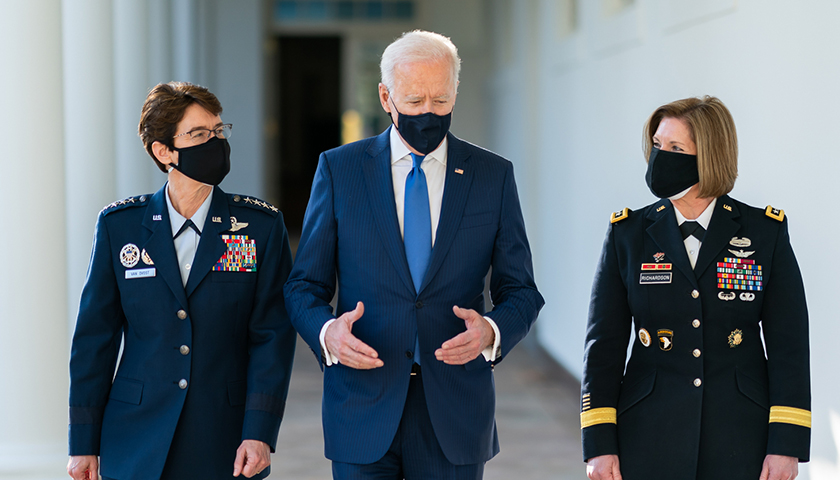by Sen. Bill Hagerty & H.R. McMaster
Media outlets around the world recently reported on leaked audio comments in which Iranian Foreign Minister Javad Zarif admitted that Iran’s Islamic Revolutionary Guard Corps controls all of Iran’s foreign policy decisions. Although President Joe Biden was careful to mention neither Zarif nor Iran in his speech before Congress last month, Zarif’s embarrassingly candid revelations have direct implications for Biden’s entire Iran policy: namely, it underscores that reducing economic sanctions in order to moderate the Iranian regime cannot work.
For decades, U.S. policy toward Iran has produced disappointing results, largely because American administrations have underestimated the entrenched ideology of Iran’s theocratic dictatorship and mistakenly assumed the regime can be tamed by conciliatory diplomacy. Western efforts to placate Tehran have failed consistently since the revolutionaries took power in 1979, yet recent reports indicate President Biden is in the process of repeating this failure.
Just as the Obama administration did with its disastrous 2015 Iran nuclear deal, the Biden administration is now seeking to lift economic sanctions against Iran in exchange for temporary commitments from Tehran to curb its nuclear program. A senior State Department official recently revealed that the Biden administration is reviewing all U.S. terrorism and human rights sanctions on Iran since 2017 to assess whether those sanctions were “legitimately imposed,” and that some sanctions will need to be lifted to ensure Tehran is “benefiting” from the nuclear deal. Like Obama, Biden hopes that relaxing economic pressure can convince the regime to put aside its nuclear ambitions, focus on Iran’s economy and people, stop bankrolling terrorist proxies, and become a normal member of the international community.
This misguided approach is partly driven by entreaties from European capitals that are physically remote from the Iranian security threat but want access for European companies to do business in Iran. Obama and Biden have privileged Europe’s trade interests over the urgent concerns of our Middle Eastern allies, who are directly proximate to the security threat posed by the Iranian regime.
This naïve Obama-Biden belief that conciliation can change not only the behavior, but also the very nature, of the Iranian regime is based on the false assumption that U.S. policy drives the Iranian regime’s attitudes and behaviors. In actuality, since 1979 the regime has based its decision making on an expansionist revolutionary ideology that is fundamentally hostile to the United States, Israel, Iran’s Arab neighbors, the West, and our allies around the world—something Zarif himself noted in his leaked comments.
For years, the Iranian regime’s malign actions have continued to mount, all while it simultaneously stokes naïve Western hopes that it will respond to conciliation. The regime does so only as a tactic to outlast what it sees as temporary pain. When Tehran has moderated its behavior, it has only done so in response to intense political, economic, and military pressure. Rather than abandon such an approach, the United States should work with likeminded partners in three crucial areas:
First, until the regime ends its hostility and its support for terrorists and proxy forces, the United States and its partners must improve defenses against Iranian military and terrorist capabilities.
Second, disrupting and ultimately blocking Tehran’s path to a nuclear weapon must remain a top priority, but not by using the flawed Obama-era nuclear deal. Let’s be clear: A weak nuclear agreement could provide cover for a clandestine program while the regime uses sanctions relief to accumulate the resources to fully realize its nuclear goal.
Third, the United States and its allies should impose heavy financial costs on the Iranian regime to limit the resources available to Tehran to wage proxy wars across the Middle East and beyond.
This pressure approach can achieve results. Although Supreme Leader Ali Khamenei and his Revolutionary Guards are ascendant inside Iran, they are economically feeble, dependent on oil exports and vulnerable to multinational pressure. During our time in the Trump administration, we both were directly involved in persuading U.S. allies to join in enforcing sanctions designed to deny Khamenei the cash he requires to fund proxy wars. Convincing Japan to cease importing Iranian oil, for example, was a hard-won achievement that took months of tough negotiations, but created real leverage, as did similar efforts with other oil importers.
Maintaining this leverage, however, requires constant tending, which the Biden administration swiftly abandoned. China is one example. Noting Biden’s intent to relax sanctions on Tehran, China has increased imports of Iranian oil to nearly 1 million barrels per day, a threefold increase from last year. This vast evasion of sanctions undercuts U.S. diplomacy by enabling Khamenei to ignore Western pressure.
President Biden should reverse course before it is too late. He should preserve sanctions against Tehran and should acknowledge the reality borne out by decades of painful history: that maximum pressure, not conciliation, holds the best chance to force the Iranian regime to choose either behaving like a normal nation or facing economic ruin.
– – –






Too Late?!?!?
It’s already too late. The headline photo confirms it is too late. I spent 24-years (two combat deployments) in the military and never met a female officer or NCO who could carry her weight. We reduced the qualification criteria so they could pass the tests.
Good Bye America.
he wont change course because his course is intentional.
weaken the US by any means. that’s their goal.
Tehran Joe.